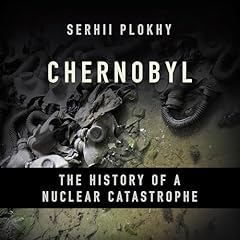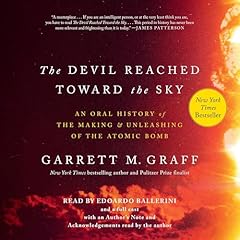
Plutopia
Nuclear Families, Atomic Cities, and the Great Soviet and American Plutonium Disasters
No se pudo agregar al carrito
Add to Cart failed.
Error al Agregar a Lista de Deseos.
Error al eliminar de la lista de deseos.
Error al añadir a tu biblioteca
Error al seguir el podcast
Error al dejar de seguir el podcast
 Exclusivo para miembros Prime: ¿Nuevo en Audible? Obtén 2 audiolibros gratis con tu prueba.
Exclusivo para miembros Prime: ¿Nuevo en Audible? Obtén 2 audiolibros gratis con tu prueba.Compra ahora por $24.94
-
Narrado por:
-
Susan Ericksen
-
De:
-
Kate Brown
In Plutopia, Kate Brown draws on official records and dozens of interviews to tell the extraordinary stories of Richland, Washington, and Ozersk, Russia - the first two cities in the world to produce plutonium.
To contain secrets, American and Soviet leaders created plutopias - communities of nuclear families living in highly subsidized, limited-access atomic cities. Fully employed and medically monitored, the residents of Richland and Ozersk enjoyed all the pleasures of consumer society while nearby, migrants, prisoners, and soldiers were banned from plutopia - they lived in temporary "staging grounds" and often performed the most dangerous work at the plant.
Brown shows that the plants' segregation of permanent and temporary workers and of nuclear and non-nuclear zones created a bubble of immunity where dumps and accidents were glossed over and plant managers freely embezzled and polluted. In four decades the Hanford plant near Richland and the Maiak plant near Ozersk each issued at least 200 million curies of radioactive isotopes into the surrounding environment.
An untold and profoundly important piece of Cold War history, Plutopia invites listeners to consider the nuclear footprint left by the arms race and the enormous price of paying for it.
©2013 Kate Brown (P)2017 TantorLos oyentes también disfrutaron:




















Reseñas de la Crítica
Las personas que vieron esto también vieron:





The only issue I had is the reader, who does not present the information with the type of enthusiasm this subject requires. Not the best voice and often mispronunciation of certain words. Although the subject is fascinating, the reader made the book made it seem long and boring at times. This is in no way a criticism of the author.
Recommended
Ups and downs
Se ha producido un error. Vuelve a intentarlo dentro de unos minutos.
Interesting listen.
Se ha producido un error. Vuelve a intentarlo dentro de unos minutos.
Cautionary Tail of mistakes made in a new field
Se ha producido un error. Vuelve a intentarlo dentro de unos minutos.
There are two kinds of death: regenerative death—such as the microbial decomposition of plant matter which creates a rich humus for new life, and degenerative death—the sort that saps the vibrancy from living systems. Fission products (the refuse from nuclear fission, such as those resultant from plutonium production, atomic bombs, and nuclear accidents) contribute to the latter.
Unlike many deadly hazards, such as fire, our bodies have no significant reaction or awareness to radioactivity until we’ve received extremely high doses, such as the kind that result in radiation poisoning. For me, this make them both fascinating and scary.
I came across this book when reading a chapter in Michael Lewis’ “Fifth Risk” on the Department of Energy, and the fact that it oversees the US nuclear arsenal. Having grown up within the fallout radius of Vermont Yankee Nuclear Power Plant, I’ve had a personal interest in learning more about this world.
The author, Brown, is a Professor of History at the University of Maryland, Baltimore County. In this book, she tracks the parallel histories of Hanford (near Richland in Washington State), and Mayak (near Ozyersk in the Ural Mountains of Russia). These were the first two sites in the world to produce plutonium, supplying materials necessary for the bombing of Hiroshima and Nagasaki, as well as the nuclear arms race of the Cold War. Brown chose a somewhat surprising angle, choosing to focus on social ironies and parallels of the two projects. The title, “Plutopia,” refers to a utopia created by plutonium production. Although employees in both facilities received higher pay than locals in the surrounding area, any wish of a utopia was dashed by the chronic exposure to radiation and the resultant diseases.
I read this book as a process of mourning of the practically eternal damage we’ve done to our peoples and ecosystems through radioactive pollution. Plutonium 239—the sort produced at Hanford and the Mayak plant—has a half-life of 24,110 years. 13.5% of fission products have a half-life exceeding 1.5 million years. In other words, much of the radioactive pollution we’ve created will endure on a geological time scale.
The book illustrates an impossible logic under which our governments operate on a daily basis. The only way to justify the immeasurable loss of life and vitality caused by plutonium production was the threat of loosing a nuclear war. Both projects have permanently contaminated thousands of square miles of land and water bodies.
In high doses, radiation leads to painful death. At moderate doses, radiation leads to leukemia, failure of the thyroid, autoimmune disorders, as well as numerous other ailments. At low doses, radiation leads to infertility and genetic mutation, resultant in genetic mutations and physiological disfigurement in offspring.
How did the USSR and United States manage unmanageable risks?
In the US, we hired corporations to run plutonium production, beginning with DuPont, followed by GE, followed by a series of other entities. When corporate and government scientists found that the plant was resulting in unaffordable environmental costs, they hired new scientists to produce new studies refuting those claims.
In Russia, they just didn’t tell anyone. Hundreds of thousands of villagers lived in deadly zones for decades without any assistance.
How did these governments run these projects?
Both were highly secretive. We failed to be secretive enough, in that Russians nuclear program directly copied our blueprints, rather than developing their own methods.
In the USSR, Mayak was run by the Gulag, which had 5 million prisoners at the end of World War II and employed one quarter of non-agricultural workers. Whereas in the US, we had some semblance of precaution, the USSR was able to burn through hundreds of thousands of soldiers and prisoners without even the most basic safety measures. The fate of this class of workers is poorly documented and likely atrocious.
Ultimately, our nuclear projects were morally repugnant, and their results be with us for the indefinite future. If you’re looking to bask in every detail of this misery, “Plutopia” is an excellent book on the subject.
Mourning an Eternity of Radioactive Pollution
Se ha producido un error. Vuelve a intentarlo dentro de unos minutos.
Before Chernobyl
Se ha producido un error. Vuelve a intentarlo dentro de unos minutos.


